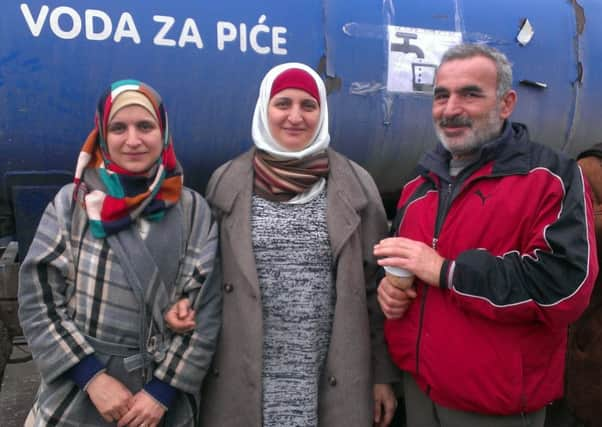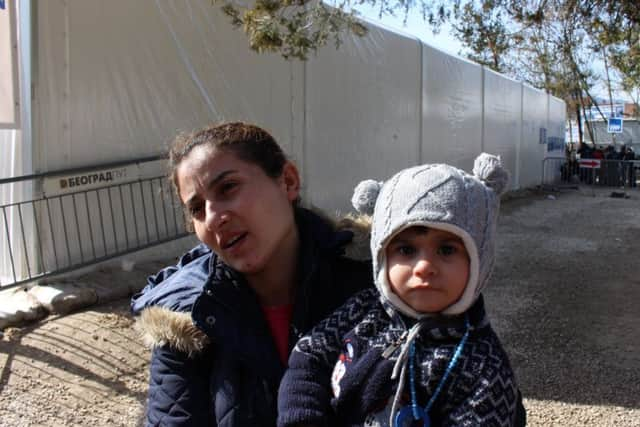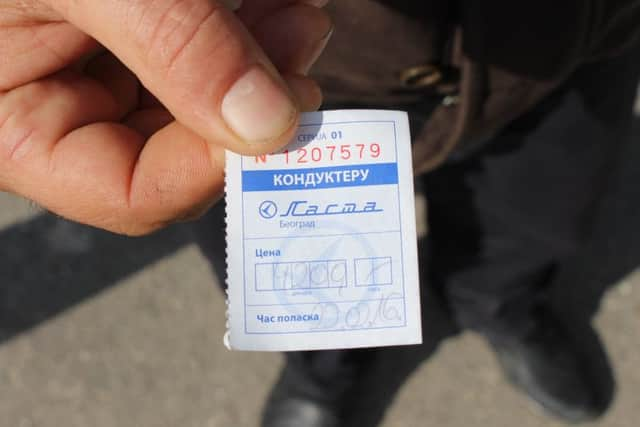Refugees in Serbia seek ticket to take them far from Syria horrors


When 26-year-old Marwa went to her local hospital in Syria to give birth to her son, she could never have predicted what was about to happen.
“The army came in and there was a fight,” she remembers. “They started firing. I was hit.”
Advertisement
Hide AdAdvertisement
Hide AdDoctors managed to save Marwa and deliver her child safely, but the baby suffered brain damage from his injuries and is now, aged four,


unable to walk or talk. He is in Munich, Germany, with his father, who took him there last year in a bid to find him urgent medical treatment no longer available in war-torn Syria. Marwa, waiting at a refugee processing centre in Serbia with her pregnant mother, 42 and father, is hoping to join them.
“He cannot cope with the noise from the war, the constant bombs and air strikes,” she says. “He does not understand and it traumatises him. We had to get him out as quickly as possible. But I have not seen him for six months.”
At the One Stop Centre in Presevo, in southern Serbia, hundreds of other families are waiting for their papers to be processed, before they are given permission to continue their journey north, part of the long and arduous route to western Europe through the western Balkans.
Iraqi Feyzah, 22, is waiting patiently in the sun for her turn to be registered by Serbian authorities, sitting on a patch of scrubland at the centre - erected just five months ago on the site of a former factory close to the Macedonian border.


She has been travelling for the past month with her extended family - a group of 12 adults and nine children. The youngest in the group is her sister’s one year old daughter, Dima, who giggles as she is passed around the family. The oldest is Feyzah’s 94 year old grandmother, who impressively marches unaided to the processing centre, tucking her headscarf around her neck.
But the walk is nothing compared to the family’s trek through Turkey, which they undertook by foot.
“We were carrying the children,” explains Feyzah. “It was so tiring. But now we have made it here, I feel more peaceful.”
Their lives in Iraq had become impossible.
Advertisement
Hide AdAdvertisement
Hide Ad

“Some family members were killed, our home was destroyed. We were scared for our own safety,” she says. “I didn’t bring anything with me, I couldn’t.” She indicates her padded jacket. “We are given a change of clothes at the borders, none of this is mine.”
Another Iraqi man, Dashti, tells me of his family and friends’s suffering at the hands of extremist groups. Some were murdered, others tortured and raped.
“We were very afraid for our children, particularly the female children,” he says. “We were terrified.”


Then, his sixteen year old son was due to be conscripted to the army, which he believes would have ultimately led to his death. “That was when we had to get out,” he said. “If I wasn’t so afraid for my son or the rest of my family, I wouldn’t have come here.”
Kawkab, 20, from Aleppo in Syria, moved eleven times in a bid to live peacefully in a part of the city which was not controlled by hostile groups.
“Every time, we were hoping that this part of the city would be safe,” she says. “But everywhere was taken over. Then the food supplies were cut off. There was nothing. No bread, no milk. We were starving. What food there was became very expensive, you could not afford it.
“We just want to live like normal people again.” She smiles. “We just want peace for the whole world.”
Advertisement
Hide AdAdvertisement
Hide AdWith her 16-year-old cousin, Rim, and other family members, Kawkab, like Feyzah, took to a boat for the crossing from Turkey to Greece.
“The most frightening part was the sea,” she says. “We thought we were going to die. We were 60 adults and 20 children packed into one boat that was meant for just 40.”
Once the families have been processed and their papers stamped, they are free to wait at a makeshift bus station at the back of the site - or wait for a refugee train to arrive.
More than a dozen buses are lined up, ready to take the refugees on the next stage of their journey: north, to Adasevci, where they will then cross the border into Croatia from the nearby Sid train station.
Smoking a final cigarette before his bus departs, I meet Taher, a smiling engineer from Syria. He is travelling with his wife and three sons after constant bombing in his hometown of Idlib forced the family to flee. The final straw came when a huge bomb landed at the end of his street, destroying the homes of many of his neighbours - and killing friends.
“We have sold everything we had - everything,” says Taher, who has had to pay 35 euros per person - including the children - to get a space on the bus. Some of the NGOs working in the area have a budget to buy tickets for those who cannot afford the fare.
“Before the war, I was an engineer, my wife was an English teacher, but I have been without a job for four years. In Syria now, there is no work for an engineer. We have destruction everywhere, not construction.”
His smile wavers for a minute. “We are searching for peace,” he says. “Syria is a very beautiful country, but it is now destroyed.”
Advertisement
Hide AdAdvertisement
Hide AdHis 16-year-old son, Haman, has dreams of becoming an architect in Germany. He has only been able to attend school for a few hours a week since the war began.
“I have had no lessons in school,” he says, in broken English. “We have one lesson in a day, then they close the school because it is too dangerous. I hope, I just hope I can study in Germany.”
As we walk away, a young woman jumps from the bus and begs my translator for her half empty water bottle. She explains in Arabic that she has already drunk from it, but the girl does not mind. “I am so thirsty,” she says. “Please.”
But refugees are not the only people waiting at the makeshift bus station at Presevo.
Mireslav, a bus driver from a town close to Belgrade, has been seconded from his usual routes to drive refugees from the southern border with Macedonia to the north of Serbia, where they leave for Croatia.
The buses are lined up, ready to be filled with refugees once they have been processed through the One Stop centre. When the centre is flooded with thousands of refugees from one train, it can take hours - sometimes even days - to ensure everyone has been registered.
And until Mireslav’s bus is full, he is unable to leave.
“Sometimes I sleep in my bus for two, maybe three, days,” he says. “I wait for there to be people.”
The buses are numbered and leave in a strict order. Mireslav’s is number 29.
Advertisement
Hide AdAdvertisement
Hide Ad“I hope to leave tonight,” he says. “But who knows.” He shrugs. “It is a job.”
Maryam, 28, a teacher with two children, hopes to join her husband, who has been living in a refugee camp in Germany for the past seven months.
“I miss him,” she says, simply. “I love him so, so much. He has not seen the children for months. The fear was growing in Syria, there were always bombs. We could not live a life there - we had to get out. When the war came, everything changed, everything.”
The family, including her six year old daughter and five year old son, walked across Syria to reach Turkey. They then crossed Turkey by bus, before risking their lives on a packed rubber dinghy to get to Greece.
“It was horrible,” she says. “The children were crying, we were terrified. We are so glad to be here.”
But the move is bittersweet. “I have left my parents behind in Syria,”
she says, tears filling her eyes. “I am very happy to be going to Germany, I want to start a new life, but it is hard.”
Advertisement
Hide AdAdvertisement
Hide AdHer sister-in-law, Rubah, is struggling with her 18 month old baby, who is exhausted from the long journey and is refusing to sleep.
Rubah, who is wearing a grey, patterned headscarf, looks exhausted as she bounces the crying child on her knee. “She is so tired,” she says. “We are all tired.”
She adds: “My biggest wish would be that we could return to Syria. That is my home. But that is not going to happen now.”
At the station, a smiling woman with sparkling brown eyes approaches us and asks if we know when the next train will arrive. The train is cheaper than the bus, at just 15 euros per person, but it takes around two hours longer.
Ranya has been waiting, with her four children and husband, Rezah, a tailor, since 3am, when their train arrived from Macedonia. They are all exhausted. But what is most difficult, she says, is that they have no idea when they will leave.
“It could be in five minutes, it could be tomorrow, we don’t know,” she says. “We have not slept for days.”
Her middle son, Rojan, nine, can hardly read or write, she says. “He has had no school,” she explains. “My older son, who is thirteen, he has had three years of school. Everything he ever learned then, he will have forgotten. There is no hope for them in Syria.
“All children of five years or younger, all they know is the war. When they play, they talk of bombs, of aeroplanes, of death. The conditions are tough.”
Advertisement
Hide AdAdvertisement
Hide AdStanding nearby, a small boy’s face lights up as his mother holds a mobile phone to his ear. “Papa? Papa?” he squeals excitedly. The family hopes to be reunited when they reach Germany - the destination of choice for everyone we meet.
An aid worker manning the queues is unable to provide the waiting families with any more information. He and his colleagues are trying their best to entertain the exhausted children, playing football with them.
“We have no idea,” he says. “We just have to wait for the authorities to send a train. Sometimes, they open a train and people can sleep on it until it leaves.” He indicates the cloudless sky. “But not today. Today it is warm, so everyone has to wait outside.”
Five miles away, another train load of 700 people is expected to arrive at the Tabanovce train station on the Macedonian border during the night and after a five kilometre hike along a railway line, will be able to rest for a short time at the Miratovac camp on the Serbian side of the border, before being bussed to Presevo to register. For the aid workers and Serbian officials at Presevo, the process will begin all over again.
Across the field from Miratovac, the main road border crossing between Macedonia and Serbia is visible. Balkan families are passing through on their way to holidays in Thessaloniki, Greece, unaware of the refugees just a few metres away.
Today’s refugees are lucky. After less than 24 hours waiting in the Presevo centre, they are all packed onto trains and buses and begin their journey north, arriving in Adasevci after an arduous nine hour journey.
By car, Adasevci is less than five hours away. The next morning, I arrive at the northern border camp - another One Stop Centre run by the Serbian government - to see some familiar faces. Taher waves through the window of our car as we arrive at the centre. He is still smiling.
The long journey was tiring, he says. But they are glad to be on their way.
Advertisement
Hide AdAdvertisement
Hide AdThe refugees are given soup, coffee and a chance to recharge their mobile phones. Banks of plug sockets have been set up inside the centre, a disused former motel building on the motorway near the Croatian border. Free wifi in this centre is provided in a joint venture between BT and Edinburgh-based Mercy Corps.
Signs of the building’s former occupation still remain. The “hairdresser” and “cafe-bar” signs are still visible behind sheets of paper printed in English and in Arabic, telling refugees where they can find doctors, who are on hand to treat the many bronchial illnesses suffered by the groups in the winter.
A “child-friendly space”, essentially a small nursery - where children have access to toys and games, and young mothers have a clean place to change nappies and breastfeed their babies - is run by World Vision, which also hands out food parcels to the refugees on their buses. At the child friendly space, pictures the children have created adorn the walls. Some have drawn crying faces, others love hearts with a break scribbled through them and one word: “Syria”.
Taher is standing outside of his bus, stretching his legs. He tells me his brother is living in Germany, in a refugee camp. I ask if he hopes to be placed in the same camp as his brother. He looks surprised.
“I hope, I think I will,” he says. He looks to the aid workers from World Vision, who are accompanying me on my visit, his face worried.
“I can, can’t I?” But no-one can answer that. The situation across Europe changes on a daily basis. The refugees are at the mercy of border controls, quotas and government policies.
Maryam and her family have also successfully made the journey north, arriving in Adasevci late at night. After a good night’s sleep in one of the rest tents, her children, dressed in bright, warm jackets handed to them by aid agencies, are running around, laughing, outside of the bus, playing with bubbles blown by NGO workers.
“They are happy today,” she says. “We are happy that we are one step closer to Germany. The children do not know what is happening, we have tried to protect them from it, protect them from the war as much as possible, but it is hard.”
Advertisement
Hide AdAdvertisement
Hide Ad• To learn more about how the aid agency World Vision is assisting with the Syria Crisis, visit www.worldvision.org.uk/Syria
AID AGENCIES DOING ESSENTIAL WORK
While the “one stop centres” which process refugees in Europe are run by individual governments, the hard work is carried out solely by aid organisations.
At centres like that at Adasevci in northern Serbia, the presence of aid groups - Save the Children; Mercy Corps - and my hosts, World Vision - is the only way that refugees can receive essential supplies like warm clothes and food.
There is no central leadership of the aid side of the centres: indeed, when Adasevci opened in September last year, the organisations, between themselves, divided up what needs doing.
Here, a “child-friendly space”, essentially a small nursery - where children have access to toys and games, and young mothers have a clean place to change nappies and breastfeed their babies - is run by World Vision, which also hands out food parcels to the refugees on their buses. Other groups offer “winterisation”, ensuring the refugees have access to warm clothes, while those with medical specialism such as Medicins Sans Frontieres, provide a doctor and medical supplies.
“In truth, it is simple division,” said Gavin Crowden of World Vision. “There is no point in us doing things that others are doing. We talk about what our specific skills are and what our capacity is. It works very well.”